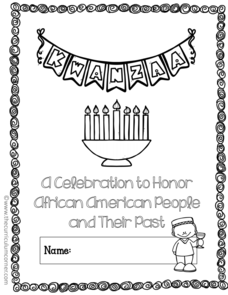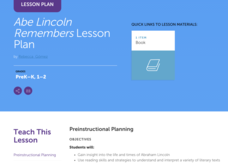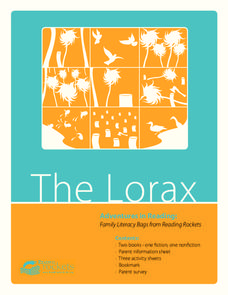Core Knowledge Foundation
Presidents and American Symbols Tell It Again!™ Read-Aloud Anthology
Scholars look into the country's current president, past presidents, the White House, Washington D.C., and the Declaration of Independence. They identify the flag, the Statue of Liberty, as well as Mount Rushmore and the significance of...
Core Knowledge Foundation
Taking Care of the Earth Tell It Again!™ Read-Aloud Anthology
A read-aloud anthology closely examines human impact on the Earth while boosting reading comprehension skills. Through stories, scholars examine the concepts of natural resources, pollution, garbage, and recycling and brainstorm ways to...
Core Knowledge Foundation
Kings and Queens Tell It Again!™ Read-Aloud Anthology
A royal read-aloud anthology offers a look inside the life of kings and queens. Songs and stories showcase royal characteristics and story elements and boost reading comprehension skills. Discussions highlight the difference between...
Core Knowledge Foundation
Native Americans Tell It Again!™ Read-Aloud Anthology
A 154-page anthology explores the life, culture, and history of Native Americans. Eight lessons follow the routine of introducing the reading, conducting the reading, discussing it, doing word work, then taking part in an extension...
Core Knowledge Foundation
Plants Tell It Again!™ Read-Aloud Anthology
A 190-page anthology explores the life and parts of plants, flowers, and trees while boosting reading comprehension skills. Literature and informational texts showcase Johnny Appleseed and George Washington Carver. Lessons follow the...
Core Knowledge Foundation
Farms Tell It Again!™ Read-Aloud Anthology
The thematic read-aloud anthology introduces young readers to life on a farm. The thoughtfully detailed resource offers three weeks of skills practice designed to boost reading comprehension skills. Lessons follow a routine of...
Core Knowledge Foundation
The Five Senses Tell It Again!™ Read-Aloud Anthology
Young readers explore the five senses with a read-aloud anthology. Each lesson follows the routine of introducing the reading, listening to a read-aloud, answering comprehension questions, then practicing a skill. Modification and...
Core Knowledge Foundation
Seasons and Weather: Supplemental Guide
From warm summer days to cold winter nights, this 10-lesson unit takes children on an exploration of seasons. Using the included reading passages and images, a series of read-aloud lessons and vocabulary activities provide young children...
Core Knowledge Foundation
Seasons and Weather: Read-Aloud Anthology
Kindergartners explore the cycle of the seasons in a 10-lesson language arts unit. Through a series of picture-supported read-aloud activities, children are able to identify the sequence of seasons and the types of weather associated...
Curated OER
The Common Core Literacy Standards - Kindergarten Posters
Can we do it? Yes we can! Your class can become Common Core masters with a fine set of posters that state each of the kindergarten literacy standards in a friendly "we can" statement. Each of the posters contains two standards, a "we...
New York City Department of Education
Grade K Literacy in Social Studies: Thinking About Families
Family is a wonderful subject for little learners to get excited about. Family is also the theme for a social studies unit that uses literacy standards throughout. The guide outlines approximately three weeks of instruction and breaks...
Education City
Black History Month
New ReviewEnhance Black History Month with a twenty-page resource designed to boost scholars' knowledge of the great accomplishments made by African Americans. Learners take in fun facts about famous inventors such as George Washington Carver and...
Core Knowledge Foundation
Columbus and the Pilgrims Tell It Again!™ Read-Aloud Anthology
A read-aloud anthology focuses on Columbus and the pilgrims. Young scholars listen to several stories covering Christopher Columbus, the Mayflower, Plymouth Rock, pilgrims, meeting Native Americans, and the first Thanksgiving. Nine...
Core Knowledge Foundation
Colonial Towns and Townspeople Tell It Again!™ Read-Aloud Anthology
A read-aloud anthology focuses on colonial towns and townspeople. Over three weeks, young scholars listen to stories, participate in discussions about town life, practice word work, and complete an extension activity with each lesson.
PBS
Reading Adventure Pack: Farms
A Reading Adventure Pack features a fiction and nonfiction text—The Oxcart Man by Donald Hall and illustrated by Barbara Cooney and Farming by Gail Gibbons. Following the readings, scholars make a collage showcasing foods farmed from...
PBS
Reading Adventure Pack: Music
Music is the focus of the reading adventure pack. After reading, pupils complete hands-on activities. Scholars use household items to make shakers and cymbals. They listen to eclectic music by turning on the radio, borrowing music from...
PBS
Reading Adventure Pack: Sleep
A reading adventure pack features two stories—Time to Sleep by Denise Fleming and Animals Don’t Wear Pajamas by Eve Feldman. In response to reading the fiction and nonfiction texts, scholars create a dreamcatcher, discuss hibernation,...
Curriculum Corner
Kwanzaa — A Celebration to Honor African American People and Their Past
A 10-page packet delivers a plethora of information about Kwanzaa—a week-long holiday that celebrates African American people and their heritage. Each page consists of informational text and an opportunity to respond to through pictures...
Read Write Think
Poetry Portfolios: Using Poetry to Teach Reading
Over the course of five periods, scholars create a poetry portfolio. They begin with a reading of the poem, Firefly. With a focus on vocabulary, learners reread the poem then look for sight words and other skills.
Macmillan Education
Women's History Month Activity Kit
Boost reading comprehension and shed light on famous women of history with books and learning activities, which include a board game, word search, crossword puzzle, and a quiz.
Read Works
Edison Tried and Tried Again
How many times did it take Thomas Edison to invent a successful working lightbulb? Young learners read a short passage about this famous inventor and his determination in getting an idea to work successfully. Then, pupils respond to four...
Scholastic
Abe Lincoln Remembers Lesson Plan
Discover the life of Abraham Lincoln with help from the story Abe Lincoln Remembers by Ann Turner. After listening carefully, scholars reflect on what they deem as Lincoln's most influential life event and how it relates to them,...
PBS
Reading Adventure Pack: The Lorax
Accompany a reading of The Lorax by Dr. Seuss and Tell Me, Tree by Gail Gibbons with an activity packet designed to bring awareness to nature, specifically trees. Scholars take to the outside, draw lines to create trees reminiscent of...
Rainforest Alliance
The Long Road to Coffee
During the fourth activity of a series on Colombia, pupils discover the process to which the coffee plant becomes the coffee we drink. Pupils compare how locally grown foods get into homes to how coffee from Colombia gets into their mug.

























